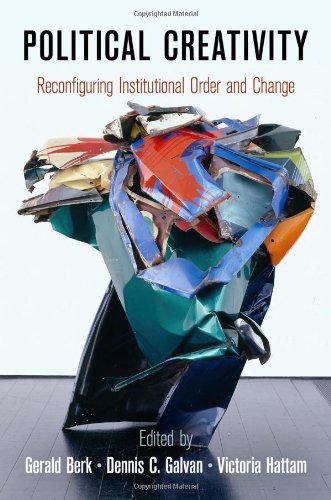

Most ebook files are in PDF format, so you can easily read them using various software such as Foxit Reader or directly on the Google Chrome browser.
Some ebook files are released by publishers in other formats such as .awz, .mobi, .epub, .fb2, etc. You may need to install specific software to read these formats on mobile/PC, such as Calibre.
Please read the tutorial at this link: https://ebookbell.com/faq
We offer FREE conversion to the popular formats you request; however, this may take some time. Therefore, right after payment, please email us, and we will try to provide the service as quickly as possible.
For some exceptional file formats or broken links (if any), please refrain from opening any disputes. Instead, email us first, and we will try to assist within a maximum of 6 hours.
EbookBell Team

4.7
56 reviewsPolitical Creativity intervenes in the lively debate currently underway in the social sciences on institutional change. Editors Gerald Berk, Dennis C. Galvan, and Victoria Hattam, along with the contributors to the volume, show how institutions inevitably combine order and change, because formal rules and roles are always available for reconfiguration. Creative action is not the exception but the very process through which all political formations are built, promulgated and changed.
Drawing on the rich cache of antidualist theoretical traditions, from poststructuralism and ecological theory to constructivism and pragmatism, a diverse group of scholars probes acts of social innovation in many locations: land boards in Botswana, Russian labor relations, international statistics, global supply chains, Islamic economics in Algeria, Islamic sects and state authority in Senegal, and civil rights reform, colonization, industrial policy, and political consulting in the United States. These political scientists reconceptualize agency as a relational process that continually reorders the nature and meaning of people and things, order as an assemblage that necessitates creative tinkering and interpretation, and change as the unruly politics of time that confounds the conventional ordering of past, present, and future. Political Creativity offers analytical tools for reimagining order and change as entangled processes.
Contributors: Stephen Amberg, Chris Ansell, Gerald Berk, Kevin Bruyneel, Dennis C. Galvan, Deborah Harrold, Victoria Hattam, Yoshiko M. Herrera, Gary Herrigel, Joseph Lowndes, Ato Kwamena Onoma, Adam Sheingate, Rudra Sil, Ulrich Voskamp, Volker Wittke.